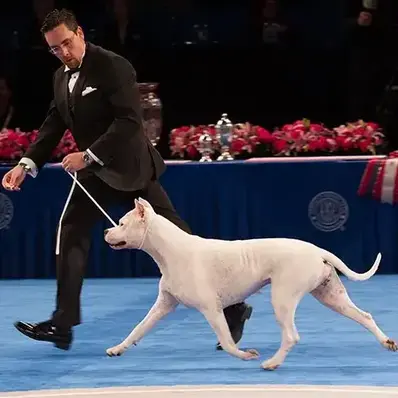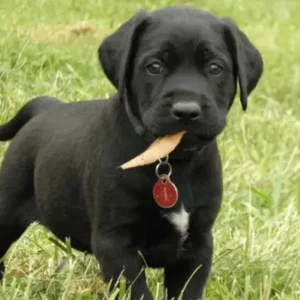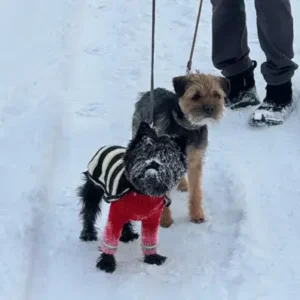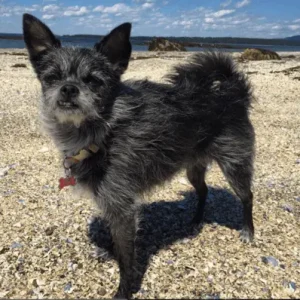Dogo Argentino History/Origin
The Dogo Argentino originated in the province of Cordoba, in central Argentina. Dr. Antonio Nores Martinez, a well-known doctor, created the breed in 1928. Coming from a family with a passion for dogs, he set the standards for the Dogo Argentino by crossbreeding several purebreds with the old fighting dog from Cordoba. Through careful selection over generations, he achieved his goal and established the first family of Dogo Argentinos.
Nores Martinez with his Dogo Argentino- Source: AKC.org
Initially, people viewed the breed as a fighting dog. However, Dr. Nores Martinez’s interest in hunting revealed the breed’s hunting skills. The Dogo Argentino soon became known as an excellent big-game hunting dog.
Over time, the breed has shown versatility, proving to be a noble companion and a loyal protector. Dogo Argentino is recognized by the American Kennel Club (AKC) under the Working Group.
Its strength, tenacity, keen sense of smell, and bravery make it ideal for hunting wild boars, peccaries, pumas, and other predators in Argentina. The Dogo Argentino’s harmony, balance, and athletic build enable it to endure long trips in any weather and fiercely engage with prey.
In 1973, the FCI recognized it as the first and only Argentine breed, thanks to the efforts of Dr. Augustin Nores Martinez, the creator’s brother.
Dogo Argentino Personality
The Dogo Argentino is one of the dog breeds that is loyal with a strong territorial instinct, making them excellent watchdogs. They are fierce defenders of their human families, including children, displaying a protective nature that ensures the safety of their loved ones.
Their strong prey drive contributes to their exceptional hunting abilities, allowing them to take down wild boars with ferocity and strength.
- Temperament
The Dogo Argentino is known for its bold and protective temperament. It is fiercely loyal to its family and shows affection, especially to children. This breed naturally takes on the role of a vigilant watchdog due to its strong sense of territory.
It is brave and determined, making it an excellent hunting partner, able to confront large prey like wild boars. Because of its confident and independent nature, early training and socialization are important to guide its energy positively.
- Potential Challenges
Due to their high prey drive, Dogo Argentinos are poor companions for other animals like cats or smaller dogs. Their strong-willed nature demands consistent training and a firm handler. Without proper exercise and mental stimulation, they can become bored and destructive.
Additionally, their distrust of strangers and other dogs requires careful socialization to prevent aggressive behaviors.
Dogo Argentino Physical Appearance
The Dogo Argentino is a large, white dog with a smooth, muscular build, slightly longer than tall. These purebred dogs have a broad, slightly domed skull and a strong muzzle. Ears can be cropped or hung naturally.
- Size
Dogo Argentinos are large dogs, typically reaching a shoulder height of 24 to 27 inches. Males generally stand about an inch taller than females, averaging a weight between 80 and 100 pounds. Their bodies are slightly elongated compared to their height and are characterized by broad, imposing heads resembling American Bulldogs or Pit Bull Terriers.
- Coat color
The Dogo Argentino is known for its short, completely white coat, often with a black patch on the head. This breed’s distinctive coloration enhances its noble appearance and athletic build.
White Dogo Argentino- Source: Wikipedia
Dogo Argentino Gender Differences
Male Dogo Argentinos are typically larger and more assertive, often showing dominance toward other males. Females are slightly smaller and may exhibit more independence, but both genders are loyal and protective, and require firm training and socialization.
Dogo Argentino Feed/Nutrition
For a Dogo Argentino needing 3 cups of food per day, it’s crucial to provide a diet formulated for large breeds, ensuring they have access to plenty of fresh water. Given their high energy levels, feeding requirements will vary as they transition from puppyhood to adulthood.
To establish an appropriate feeding plan tailored to your Dogo Argentino’s needs, consulting a veterinarian or professional nutritionist is highly recommended. Mango can be a healthy treat for your dog, as it is rich in vitamins, but be sure to remove the pit and skin before serving.
Dogo Argentino Health
Typically robust, the Dogo Argentino is known for its overall good health and minimal genetic issues. By collaborating with a reputable breeder, potential owners can receive essential guidance regarding any specific health considerations associated with the breed.
- Pigment-Related Deafness: Pigment-related deafness is linked to the white coat color in Dogo Argentinos. It affects the inner ear’s ability to transmit sound signals, leading to partial or complete deafness in one or both ears. To manage this condition, it is crucial to have your dog tested for deafness if you notice any signs of hearing impairment. Responsible breeding practices can help minimize the risk, and using visual cues can assist in accommodating a dog with hearing limitations.
- Hypothyroidism: Hypothyroidism occurs when the thyroid gland produces insufficient hormones. Symptoms include fatigue, weight gain, hair loss, dry skin, intolerance to colds, and behavioral changes. Regular veterinary exams are important for monitoring thyroid function, and if diagnosed, your dog will need lifelong medication. Maintaining a healthy diet can also support overall health and weight management.
- Glaucoma: Glaucoma is characterized by increased pressure within the eye, which can damage the optic nerve and lead to vision loss. If symptoms such as redness, excessive tearing, or a cloudy cornea are observed, prompt veterinary care is essential to prevent vision loss. Treatment may involve medication or surgery.
- Laryngeal Paralysis: Laryngeal paralysis occurs when the muscles controlling the larynx become weak or paralyzed, causing breathing difficulties, especially during exercise or in hot weather. If symptoms like noisy breathing or gagging occur, seek veterinary advice. In severe cases, surgical intervention may be necessary.
- Hip Dysplasia: Hip dysplasia is a genetic condition where the hip joint doesn’t develop properly, leading to pain, lameness, and mobility issues, particularly in larger breeds like the Dogo Argentino. Symptoms include difficulty rising, bunny hopping gait, and hind limb lameness. Maintaining a healthy weight and providing moderate exercise are important for managing the condition. Joint supplements and medical treatments may be needed in severe cases.
Dogo Argentino Care and Grooming
Regular grooming for your Dogo Argentino goes beyond just weekly sessions. Occasional baths will maintain their cleanliness and appearance, while grooming sessions can strengthen your bond with them. Their nails, which grow quickly and are strong, should be trimmed regularly to prevent issues like overgrowth and cracking.
It’s important to check their ears regularly for wax buildup, which can lead to infections, and their teeth should be brushed routinely for optimal dental health.
Despite their short coat being relatively low-maintenance, their size can make grooming a bit more challenging. Although they do shed, their short coat minimizes the visibility of loose hair compared to longer-haired breeds. Keeping a lint roller on hand can help manage any stray hairs effectively.
In addition to grooming, exercise is essential for your energetic Dogo Argentino. Daily walks, runs, and playtime are necessary to keep them healthy and prevent boredom-related behaviors.
Engaging in activities like agility training or fetch will provide both physical and mental stimulation. Without sufficient exercise, they may become restless and harder to manage. Additionally, consistent training on how to stop your dog from barking will help them develop better behavior and improve their overall obedience.
Dogo Argentino Rescue Groups
Rescue groups play a crucial role in providing care, rehabilitation, and new homes for Dogo Argentinos in need. They work tirelessly to rescue dogs from shelters, abusive situations, or neglect, ensuring they receive necessary veterinary care and behavioral rehabilitation. By facilitating adoptions and educating the public about responsible dog ownership, rescue groups make a significant impact in improving the lives of Dogo Argentinos and promoting their welfare.
Dogo Argentino Price
The price of a Dogo Argentino typically ranges from $1,500 to $3,500, depending on factors such as breeder reputation, pedigree, and location.
When considering purchasing a Dogo Argentino, it’s essential to seek out reputable breeders who prioritize ethical practices. Ethical breeders prioritize the health and well-being of their dogs, conducting health screenings and providing proper socialization from an early age.
Interesting Facts
- They have been featured in the movie “Homeward Bound II: Lost in San Francisco”
Homeward Bound II: Lost in San Francisco- Source: IMDb
- Mickey Rourke has owned a Dogo Argentino.
Mickey Rourke with his Dogo Argentino- Source: mickey_rourke
Best For
Dogo Argentinos are best suited for experienced dog owners who can provide firm training and ample exercise. They thrive with active individuals or families who have the time to socialize them properly and understand their protective nature. As loyal and affectionate companions, Dogo Argentinos excel in homes where they receive consistent leadership and a loving environment.
Top Names
| Male Dogo Argentinos Names | Female Dogo Argentino Names |
| Zeus | Luna |
| Thor | Bella |
| Max | Maya |
| Rocky | Stella |
| Titan | Roxy |









 Nores Martinez with his Dogo Argentino- Source:
Nores Martinez with his Dogo Argentino- Source: 

 White Dogo Argentino- Source:
White Dogo Argentino- Source: 
 Homeward Bound II: Lost in San Francisco- Source:
Homeward Bound II: Lost in San Francisco- Source:  Mickey Rourke with his Dogo Argentino- Source:
Mickey Rourke with his Dogo Argentino- Source: 






